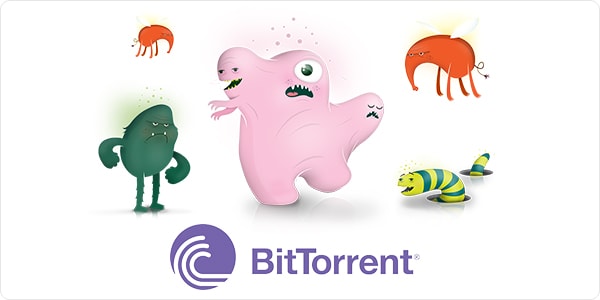People use BitTorrent to share large files but worry about its safety and legality in 2023.
Torrenting without knowledge can expose user data and lead to legal problems.
This 2023 guide will discuss BitTorrent safety, legality, risks, and best practices to keep users secure and law-abiding.
What is BitTorrent?
BitTorrent is a peer-to-peer file-sharing protocol that enables users to distribute data across the internet in a decentralized manner. This protocol works by breaking down large files into smaller pieces, enabling users to download parts of the file from multiple sources simultaneously, leading to a quicker download speed.
BitTorrent is used by millions daily and is a popular method for downloading large files, such as digital media or software. Torrent files don’t rely on a single source or server to deliver content but instead rely on the collaborative bandwidth of its users.
However, while the underlying technology is legal and has many legitimate uses, it has been associated with copyright infringement due to sharing copyrighted materials like movies, music, or software. Therefore, using BitTorrent requires due diligence and an understanding of the legal environment around copyrighted materials.
Example use-cases of BitTorrent are distributing open-source software or sharing large datasets for research purposes.
Remember that while the BitTorrent protocol itself is safe, the content you download may not be, and you should always use a trusted VPN for added security when using BitTorrent.
Is BitTorrent Legal?
Yes, BitTorrent itself is legal. It is a legitimate file transfer protocol for sharing files across the internet. The protocol itself is not illegal and has numerous lawful applications. It has been used to distribute large files, such as software updates or digital media content.
However, the issue of legality arises when BitTorrent is used for sharing copyrighted materials without the owner’s permission. Downloading or distributing copyrighted material without authorization is illegal and can lead to severe consequences, such as fines or lawsuits.
Court decisions in various jurisdictions have enforced the illegality of sharing copyrighted files through BitTorrent. These enforcement measures vary across countries and different states within countries.
Therefore, while BitTorrent as a file-transferring program is legal, using it for illegal purposes, such as sharing copyrighted content without permission, is not.
Is BitTorrent Safe to Use?

As a file-sharing protocol, BitTorrent is legal and safe in its basic functionality. It allows for the efficient transfer of files over the internet by breaking them down into parts, a process known as torrenting.
However, the safety concern arises not from the BitTorrent platform itself but from the nature of the files being shared. BitTorrent can be used to share any type of file, and the legality and safety of these files largely depend on their content and copyright status.
Downloading copyrighted material, such as newly released movies or music, without the copyright owner’s permission is illegal. Also, as a peer-to-peer sharing platform, BitTorrent may expose users to potentially unsafe files containing malware, viruses, or other dangerous content.
Consequences of Unsafe Torrenting
Unsafe torrenting can lead to a variety of consequences, both legal and technical. Below are a few of the potential risks associated with unsafe or illicit torrenting:
- Legal Consequences: Downloading or sharing copyrighted material without permission is illegal. Depending on your location, violation of copyright law can lead to:
- Fines or lawsuits from copyright owners.
- Notifications or warnings from your internet service provider (ISP), possibly leading to your internet being slowed or disconnected.
- Malware and Viruses: Torrent files can sometimes contain harmful malware or viruses that can infiltrate and harm your device. This can compromise your system’s performance, or worse, your personal data could be stolen.
- Phishing Risks: Some torrent sites may try to trick you into providing personal information, which can be used for nefarious purposes, including identity theft.
- Intrusion Risks: When torrenting, your IP address is visible to other swarm members (the group of people uploading and downloading a particular file). This could potentially expose your device to targeted attacks.
- Potential of Unwanted Content: Sometimes, the content you download may not be what it seems. You might end up downloading explicit or offensive content packaged as the expected file.
Step-by-Step Guide to Safely Using BitTorrent
- Choose a BitTorrent Client: You first need a BitTorrent client. Some popular choices include qBittorrent, Deluge, and Transmission. These programs are user-friendly and don’t have any bundled software, making them safe and trustworthy.
- Use a Reliable VPN: As earlier stated, a Virtual Private Network (VPN) is crucial when torrenting. It anonymizes your traffic by masking your IP address, adding a layer of privacy and safety. Opt for a VPN provider with a strict no-logs policy, strong encryption, and fast connection speeds.
- Select Safe Torrents: Not all torrents are safe to download; some are malicious files or contain copyrighted material. Check the comments on the torrent to see if other users found it safe and helpful.
- Check the Legal Aspect: Always confirm that your downloading content does not breach copyright laws. As it’s illegal to download copyrighted content without permission, always look for legal torrents.
- Utilize Antivirus software: To counter the risk of malware and viruses, ensure you have robust antivirus software active on your device.
- Regularly Update the BitTorrent Client: Developers release updates to their software to fix bugs, add new features, and improve safety. Keeping your client software up-to-date is important for security.
Conclusion
In summary, BitTorrent is helpful when used safely and responsibly. You can avoid security issues or breaking copyright laws by understanding risks and following best practices.
That’s all for now.
If you’re still concerned about downloading torrent files, please contact us in the comments below.




![Pulse SMS - Premium Texting App For Andriod [2021]](https://hitechgazette.com/wp-content/uploads/2021/06/GGF.png)